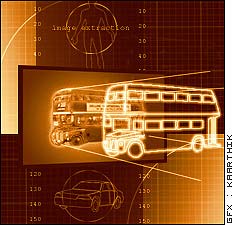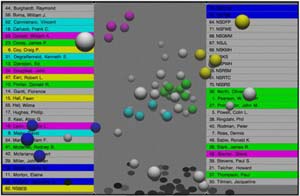In less than a month, researchers at USC’s Information Sciences Institute and collaborators nationwide have built one of the world’s best systems to translate Hindi text into English and query Hindi databases using English questions.
This effort was part of the “Surprise Language” project, a test of the computer science community’s ability to create translation tools quickly for previously unresearched languages sponsored by the Defense Advance Research Project Agency (DARPA). The ex
Web users are picky and impatient, typically visiting only the first three results from a query, with one in five searchers spending 60 seconds or less on a linked Web document, according to Penn State researchers.
“People make instantaneous judgments about whether to stay on a site, and if a site doesn’t the give the right impression, users will bypass it,” said Dr. Jim Jansen, assistant professor in Penn State’s information sciences and technology (IST). “A page has to be well-d

Lawrence Berkeley National Laboratory (Berkeley Lab) scientists have developed the world’s first x-ray computed tomography (CT) scanner capable of examining entire core samples at remote drilling sites. The portable device, which employs the same high-resolution imaging technology used to diagnose diseases, could help researchers determine how to best extract the vast quantities of natural gas hidden under the world’s oceans and permafrost.
The scanner images the distribution of gas hydrate
Multi-National team of physicists include Weizmann Institute Scientists
Recent results of a joint experiment conducted by 460 physicists from 57 research institutions in 12 countries strongly indicate that the scientists have succeeded in reproducing matter as it first appeared in the universe; this matter is called the quark-gluon plasma. The experiment, called PHENIX and conducted at the Brookhaven National Laboratory on Long Island, New York, has brought together physicists from Br

Inflation’s got nothing to do with it. Since the beginning of time, a picture has always been worth more than a thousand words. But in this age of information proliferation, that reality is the taproot of a vexing problem that Zhongfei “Mark” Zhang, an assistant professor of computer science at Binghamton University, is determined to help solve.
From personal and commercial digital image libraries and multimedia databases to data mining programs and high-tech security and defense survei

Researchers at the University of Southern California have created a new tool for organizing and visualizing collections of electronic mail. It is designed to help legal researchers, historians, archivists, and others faced with challenges in dealing with large email archives.
For examples, consider the following cases:
* A large corporation has just received a subpoena for all email messages on a specific question. Traditional keyword searches return an enormous volume of ma